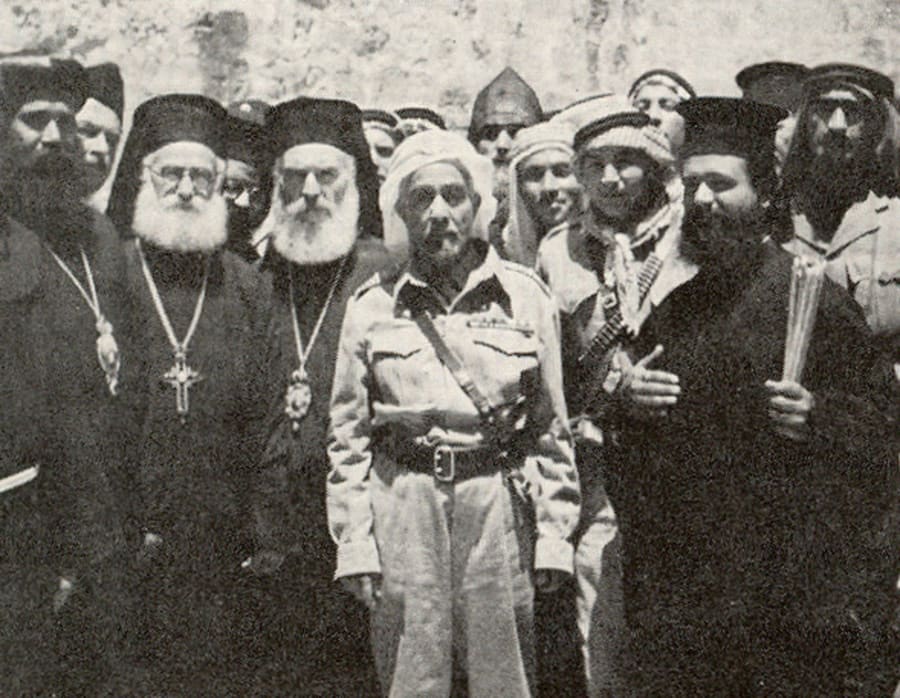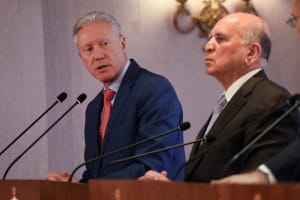King Abdullah’s legacy – and the state of Arab-Israeli relations
Author writes that it is in the interest of both Israel and Jordan to have peace and that Israel should be supportive of the Hashemite monarchy which has provided stability in the region

On a clear day, I can see the skyline of Amman from my Judean mountain balcony. It’s the only place in the world from where one can see the capital of two countries: Jordan and Israel.
I look across the border and am reminded that more than 3,500 years ago, the Jewish people stood there waiting to cross into the Land, and two and a half tribes settled on the east bank of the Jordan River: Reuben and Gad, and half of the tribe of Manassah. I think about relations with our modern neighbors often.
This week in 1951, Jordan’s first king – Abdullah I – was assassinated while visiting the al-Aqsa Mosque on the Temple Mount on July 20. He was accompanied by his teenage grandson, Hussein, who would become King of Jordan about a year later and reign until his death in 1999. Hussein is the father of the current King Abdullah II.
I was speaking about Jordan and the Hashemite monarchy with a friend this week, saying that it’s in both Israel’s and Jordan’s interests to have close, peaceful relations, and that Israel should want to be supportive of the Hashemite monarchy which, more or less, has provided stability in the region.
King Abdullah I was known for his efforts to reach some form of peace or coexistence with Israel, before Israel’s declaration of independence in 1948, and following, although he was assassinated four decades before the formal 1994 peace treaty was finally reached. Unfortunately, while there have been high points of relations between Israeli and Jordanian leaders, the idea of peace with Israel is still not popular on the Jordanian street. There’s often hostility, even among its elected leaders who often make antagonistic, threatening anti-Israel statements.
This is a mistake of the Jordanian (and before that, Egyptian) peace agreements, where there’s been no significant cultural shift or interaction between people. This could be due to lack of vision, or more likely as an outlet to provide a way for the people to vent, against Israel rather than the monarchy.
Consequently, despite the mutual interests to have peace, one rooted in the legacy of King Abdullah I, the relationship even between governments has often been tense, particularly in recent years.
Abdullah was assassinated by Mustafa Shukri Ashshu, who was associated with the rabidly extremist and anti-Semitic former Mufti of Jerusalem, Haj Amin al-Husseini. Husseini was known for sparking riots against Jews in British-controlled Mandatory Palestine, and was closely allied (and infamously photographed) with Adolf Hitler during World War II. Husseini inspired his followers to oppose the Hashemite kingdom in general, and King Abdullah in particular, largely because Husseini supported the creation of an independent Arab state, which Abdullah’s annexing and occupying the potential territory thereof (the West Bank, or Judea and Samaria) following the 1948-49 War of Independence would prevent.
Both preceding and following the 1948 war, King Abdullah met with Reuven Shiloah, the first director of Israel’s Mossad, and Golda Meir (who would become prime minister). There are famous stories of Golda dressing in traditional Arab attire to travel to meet the king so as not to be recognized.
It was reported after his death that Abdullah was scheduled to meet with Shiloah and diplomat Moshe Sasson in Jerusalem the day after he was assassinated. Avi Shalim, an Israeli-British historian, wrote a biography of King Hussein in which he quoted King Abdullah as telling Sasson, "I want to make peace with Israel not because I have become a Zionist or care for Israel’s welfare but because it is in the interest of my people. I am convinced that if we do not make peace with you, there will be another war, and another war, and another war, and another war, and we shall lose all these wars. Hence it is the supreme interest of the Arab nation to make peace with you."
According to Shalim’s biography, Elias Sasson, Moshe's father, shortly after Abdullah's assassination, wrote: "King Abdullah was the only Arab statesman who showed an understanding for our national renewal, a sincere desire to come to a settlement with us, and a realistic attitude to most of our demands and arguments... We as well as some of the Arabs and foreigners are going to feel for a long time to come his absence, and to regret more than a little his removal from our midst."
The state of Arab-Israel relations has changed radically since Abdullah’s assassination. Not only were Egypt and Jordan the first two Arab states to make peace with Israel, recognizing that it was in their interests to do so, but four more followed as part of the 2020 Abraham Accords. In three of them, it appears that some of the mistakes of cold peace of the first two have been changed. There’s not just high-level government-to-government contact between Israel and the UAE, Bahrain, and Morocco, but there’s a unique level of interaction between people, and business ties that are all mutually beneficial.
It's also noteworthy that references to Abdullah’s assassination then have had a modern historical whitewash. Immediately following Abdullah’s death, a British publication reported: “The assassin is reported to have been identified as Mustafa Shukri Ashshu, a 21-year-old tailor in the Old City. During the Arab-Jewish war he was a member of the 'dynamite squad' attached to the Arab irregular forces which were associated with the ex-Mufti of Jerusalem and became bitter enemies of Abdullah.”
Neither in this segment, nor the whole article, is there a reference to the assassin being a “Palestinian.” It was not a term or recognized nationality used in 1951 to describe the Arabs. Today, historical revisionism retroactively brands Mustafa Shukri Ashshu as a “Palestinian.”
The same Arab/Islamic extremism that was preached by Haj Amin al-Husseini, and which “inspired” King Abdullah’s assassin, is a common enemy of and threat to Israel, Jordan, and the entire Arab Middle East, spilling over around the world.
On this anniversary of the assassination of King Abdullah who might have made peace if he had lived, it’s important to revisit King Abdullah’s words, that not only is peace important, but where we share common threats, so too it’s important that we unite against these.
I pray that King Abdullah II will remember these words and wisdom of his "great" grandfather for whom he is named, and resolve, unconditionally, to continue on this path, and a warming of the cold, albeit practical, peace that exists. And that Israel will always have the fortitude and vision to reciprocate and support that pursuit.

Jonathan Feldstein was born and educated in the U.S. and immigrated to Israel in 2004. He is married and the father of six. Throughout his life and career, he has become a respected bridge between Jews and Christians and serves as president of the Genesis 123 Foundation. He writes regularly on major Christian websites about Israel and shares experiences of living as an Orthodox Jew in Israel. He is host of the popular Inspiration from Zion podcast. He can be reached at [email protected].














